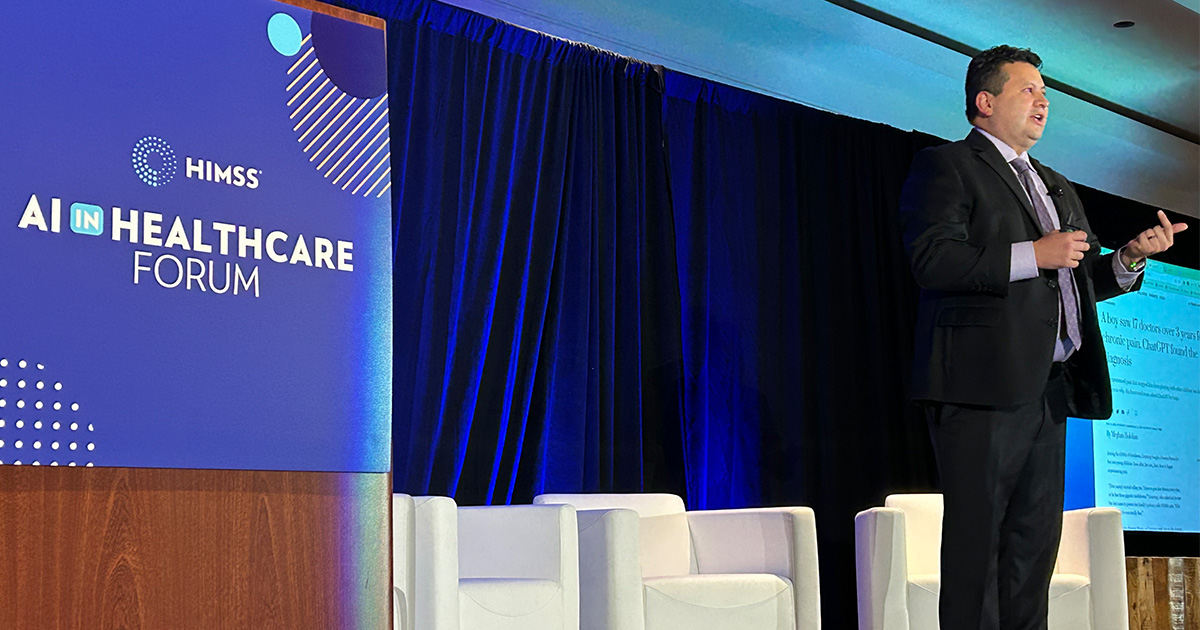
@ShahidNShah


At the HIMSS AI in Healthcare Forum, physician and author Dr. Harvey Castro explored the implications as artificial intelligence expands and increasingly augments clinical decision-making. Providers need to be key players in AI development, he said.
Read on healthcareitnews.com
SAN DIEGO – As the HIMSS AI in Healthcare Forum kicked off on Thursday morning, Rob Havasy, senior director of informatics strategy at HIMSS, offered some introductory remarks that looked back on a busy decade-plus of health IT innovation.
"I've seen a lot of technologies come and go," said Havasy. But with artificial intelligence, especially in the year-plus since ChatGPT captured the attention of the general public in a big way, "this time feels a bit different."
Whatever the use case or type of automation technique – clinical or operational applications, broad and narrow AI, predictive analytics or generative and LLMs – "AI is no longer a futuristic concept," he added. "It's a daily reality in our hospitals and clinics."
AI has great potential – but with that comes great responsibility to deploy it correctly, said Havasy. There are significant issues around patient safety, model transparency, privacy and security, efficacy, regulation, education and more that need urgent addressing.
Which was why 200 or so clinical and technology leaders had convened to learn from each other about this still-emerging but fast-evolving technology.
"There are no experts here with 25 years of experience," said Havasy. Because healthcare IT news in its current form is still so new, "we're all discovering this together."
To kick off the two-day conference, he introduced Dr. Harvey Castro, a practicing ER physician, chief clinical operating officer at ViTel Health and assistant professor at UT Austin. He's also the author of numerous books focused on AI and healthcare and host of GPT Podcast.
Castro has been an early enthusiast of ChatGPT's promise for healthcare. And he is an enthusiastic user of the technology. His podcast, for instance, is largely AI-generated.
"I clone my voice, and I clone my business partner's voice. I go into a medical journal, find something fun that's AI in healthcare. And then I have ChatGPT create a conversation."
When it comes to healthcare, he sees big opportunities ahead. For one example, he suggests that healthcare providers take a similar approach to automating their approach to discharge instructions, reading back information to patients in a language they can understand.
Or maybe using generative AI imaging to create a coloring book to help pediatric patients learn about and manage their conditions.
There's a lot of potential for genAI, of course. But plenty of people have trepidations about how this fast-changing and largely untested new fact of life will impact the providers who deploy it and the patients they care for. But Castro is optimistic.
"Everybody knows evidence based medicine, but have you thought of intelligence based medicine?" he said. "With AI, we're able to augment and we're able to see things" – from basic patient engagement patterns to complex structures of neural proteins.
AI has been moving at lightning speed, and most clinicians are embracing it but some are still skeptical. In Castro's equation, most should rest easy, at least for now.
As he sees it: "AI-plus-human is better than just human." But for the moment, at least, "human is better than AI."
Continue reading at healthcareitnews.com
The FHIR data standard is in the class of tech enablement tools and because it was designed specifically for healthcare it is an acceleratorRead on hitconsultant.net
Posted Dec 15, 2023 Healthcare #FHIR
Connecting innovation decision makers to authoritative information, institutions, people and insights.
Medigy accurately delivers healthcare and technology information, news and insight from around the world.
Medigy surfaces the world's best crowdsourced health tech offerings with social interactions and peer reviews.
© 2025 Netspective Foundation, Inc. All Rights Reserved.
Built on Apr 25, 2025 at 12:44pm